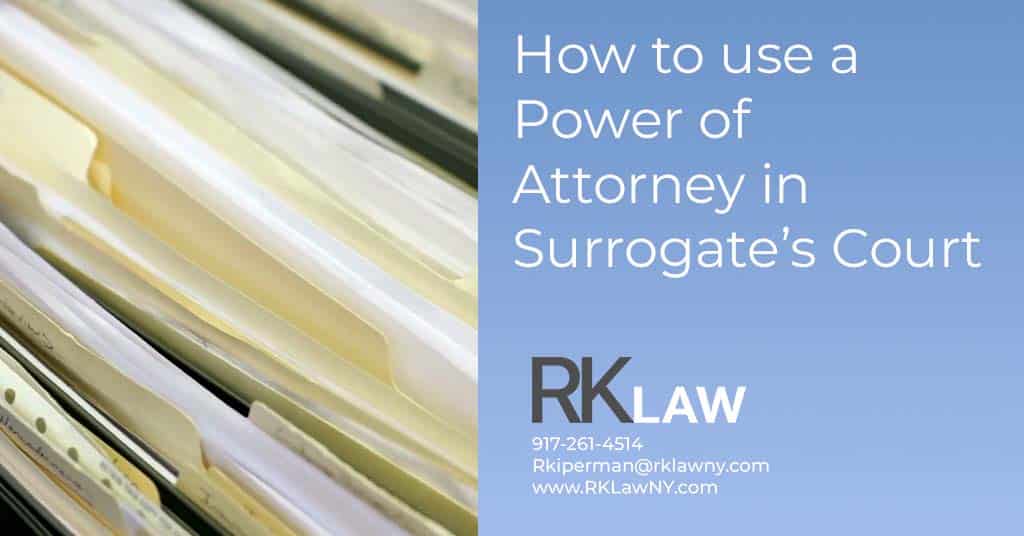How to Use and Record a Power of Attorney in Surrogate’s Court
Although a fiduciary cannot delegate their duties, and a fiduciary cannot execute a Power of Attorney in favor of another, there are some instances when a Power of Attorney can be used in Surrogate’s Court. Indeed you can record a Power of Attorney in Surrogate’s Court and have your agent protect your interests on your behalf.
A Power of Attorney executed and filed in conformity with EPTL 13-2.3 is often used by estate beneficiaries or other interested persons who reside in foreign countries but wish to make an appearance in Surrogate’s Court proceedings to protect their interests. It is also sometimes used to appear in proceedings or execute Waivers and Consents on behalf of incapacitated individuals. It is also often used by heir locator firms which seek out potential heirs and for a fee appear on their behalf in kinship hearings.
To use a Power of Attorney you have to record the Power of Attorney.
How Can You Record a Power of Attorney?
To records a Power of Attorney, you have to first understand and follows Surrogate’s Court Rule Section 207.48, which provides, in relevant part, as follows:
Section 207.48 Filing and recording of powers of attorney.
(a) No power of attorney affecting any interest in a decedent’s estate shall be filed or recorded pursuant to EPTL 13-2.3 unless:
(1) the instrument is satisfactory to the court as to form, content and manner of execution; and
(2) the person offering the instrument for filing or recording shall furnish an affidavit of the attorney-in-fact, stating:
- the circumstances under which the power of attorney was procured;
- the post office address of the grantor,
- the amount of his or her interest and relationship, if any, to the decedent;
- the financial arrangement and exact terms of compensation of the attorney-in- fact or of any other person concerned with the matter;
- disbursements to be charged to the grantor;
- a copy of any agreement concerning compensation; and
- the name of any attorney representing the attorney-in-fact.
(b) An attorney-in-fact in a proceeding for the determination of kinship shall not accept any payment for acting pursuant to a power of attorney unless there has been filed with the court all the terms of the agreed-upon compensation or the same has been fixed by the court in a proceeding pursuant to SCPA 2112.
We have also secured attorney affirmations from the attorney who has prepared the Power of Attorney and submitted it to the Court as well.
Be sure to record a Power of attorney in the Surrogate’s Court that granted the Letters or where the Surrogate would have jurisdiction. When you record a Power of Attorney, it confers on the Surrogate jurisdiction over the grantor and the attorney-in-fact.
What Can You Use a Power of Attorney For In Surrogate’s Court?
Once you record a Power of Attorney, you can use it for a variety of purposes. We have successfully used a Power of Attorney to appear on behalf of a beneficiary or distributee in order to:
- Compel an accounting of an estate
- Compel an accounting of a Trust
- Compel the production of a Will
- Execute a waiver and consent (so long as there is no conflict between the agent under the Power of Attorney and the person seeking to the Fiduciary)
- Object to Probate of a Last Will and Testament
- Object to issuance of Letters of Administration
For more information, please contact NYC Probate Litigation, Guardianship, NYC Probate and Estate Planning attorney Regina Kiperman:
Phone: 917-261-4514
Fax: 929-556-2089
Email: rkiperman@rklawny.com
Or visit her at:
40 Wall Street
Suite 2508
New York, NY 10005
Visit Regina on LinkedIn
Visit Regina on Facebook
This page is made available by the lawyer for educational purposes only as well as to give you general information and a general understanding of the law, not to provide specific legal advice. By using this site you understand that there is no attorney client relationship between you and the lawyer. The post should not be used as a substitute for competent legal advice from a licensed professional attorney in your state. ATTORNEY ADVERTISING.
